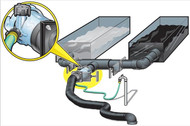Why You Should Keep Your RV Black Tank Valve Closed at Hookups
Posted by Happy Campers Store on Oct 16th 2024
Why It’s Essential to Keep Your RV Black Tank Valve Closed at Full Hookups
It’s tempting to leave your black tank valve open when you’re hooked up—but that “set it and forget it” habit is the fastest way to create pyramid clogs, stubborn odors, and sensor errors. Here’s the simple science behind why the valve should stay closed—and the routine that keeps everything flowing.
The Physics: Why the Valve Stays Closed
Solids don’t move without liquids. When the valve is left open, liquids drain continuously while solids and paper linger, dry out, and stack into a hard cone right under the toilet—aka a pyramid plug. Keeping the valve closed lets the tank fill so gravity and water volume carry everything out together when you dump.
What Happens If You Leave the Valve Open
- Pyramid clogs: Solids pile up near the toilet opening and harden.
- Persistent odors: Direct gas path + stuck residue = stink inside the RV. See RV smells like sewage.
- Sensor errors: Dried waste on tank walls/sensors causes false “full” readings.
- Hard-to-remove sludge: You’ll need light remediation or a periodic deep clean.
The Right Routine at Hookups
- Keep the black valve closed while camping.
- Dump when the tank is about 2/3 full or every 3–5 days.
- After dumping, flush/rinse in short cycles until the outlet runs clear (built-in flush or wand).
- Prime the tank with 1–2 gallons of water and add treatment.
Prevention That Actually Works
- Use enough water with every flush (1–2 seconds minimum).
- Rinse every time you dump—short rinse, close valve, wait, repeat until clear.
- After each dump, add Happy Campers mineral-based treatment to neutralize odor and help keep waste liquid between dumps.
- Schedule a deep clean periodically if you boondock often or camp in extreme heat.
Keep It Closed. Keep It Clean.
Add Happy Campers Holding Tank Treatment after each dump. It’s consistent in any climate, sensor-friendly, and pairs perfectly with the “valve closed” routine.
Shop Happy CampersFAQ: Valve Open vs. Closed at Hookups
Should I leave my RV black tank valve open at full hookups?
No. Keep it closed so liquids carry solids out when you dump. Leaving it open causes pyramid clogs and odors.
Can I leave the gray valve open?
Usually yes, but close it the day before you dump to collect rinse water for your hose. If you smell odors from gray drains, close the valve and refill P-traps.
I already have a pyramid clog—now what?
Don’t force it. Follow our light sludge remediation tips; if flow is blocked, use the unclogging guide.
How often should I dump when the valve is closed?
When the tank is ~2/3 full or every 3–5 days of active use. See how often to dump.
What treatment should I use between dumps?
A consistent, mineral-based treatment (like Happy Campers) that works regardless of temperature.



